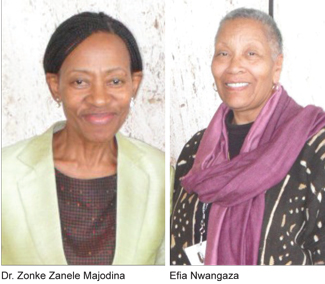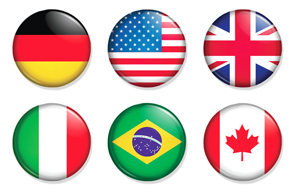Criticism of U.S. human rights record voiced during UN review
By Saeed Shabazz -Staff Writer- | Last updated: Mar 31, 2014 - 8:18:51 PMWhat's your opinion on this article?

|
The review spotlighted the U.S. domestic human rights record on issues such as police brutality, Stand Your Ground laws, political prisoners and solitary confinement, the death penalty, endemic racial inequality, voting rights, migrant and women’s rights as well as U.S. pursuit of a War on Terror using indefinite detention and drones.

|
“It was critical that we were in Geneva, March 13-14, for the ICCPR, which takes place every five years, to join our voices with those who are critical of the U.S. human rights record,” said Efia Nwangaza of the Greenville, S.C.-based Malcom X Center for Self-Determination, the Malcolm X Grassroots Movement and a member of the U.S. Human Rights Network delegation.
Some said going to Geneva allowed light to be cast on the gross failures of and false notion of so-called American exceptionalism. Perhaps anticipating a rough review, the Obama administration sent a huge delegation of government lawyers and military officials to defend the United States’ record.
The fact of the matter is the rest of the world is paying close attention to what the U.S. is doing to its citizens, Ms. Nwangaza told The Final Call. “The U.S. is so arrogant, as it continues to believe they do not have to meet international treaty obligations on human rights,” she added.

|
“The United States always wants to gossip and remark about other countries’ situations, but ignores its own issues. This is classic double standards,” said a Chinese Foreign Ministry spokesman, according to media reports.
The Chinese also commented on the use of solitary confinement in U.S. jails, an issue that Ms. Nwangaza paid close attention to during her presentation before the Deputy UN high commissioner on human rights.
The delegation attended the meeting specifically to represent political prisoners and the ongoing situation they face with solitary confinement, she said. “Cuba, Venezuela and South Africa called for the unconditional release of all U.S. political prisoners,” Ms. Nwangaza said. Solitary confinement is number 16 on the evaluation list of the International Covenant on Civil and Political Rights, the activist noted.
Dr. Zonke Zanele Majodina, a member of the UN Human Rights Commission, drew for the committee a parallel to the former use of solitary confinement by the former apartheid regime in South Africa and how the U.S. continues to use the tactic against COINTELPRO-1960s-1970s era prisoners. COINTELPRO was a covert federal government operation designed to infiltrate, neutralize, disrupt and destroy Black groups seen as threats.
She cited the case of Herman Wallace of the Angola 3, who was held in solitary confinement for 42 years and died four days after his medical release. His co-defendant, Albert Woodfox, is in his 42nd year of solitary confinement. Both men say they were targeted after becoming Black Panther Party members in prison and organizing against inhumane conditions at Angola prison in Louisiana. The men denied taking part in the killing of a guard during a prison uprising.
Dr. Majodina and Ms. Nwangaza asked what measures are the U.S. taking to eliminate or severely limit use of prolonged solitary confinement in U.S. jails, prisons, and detention facilities?
“We asked the U.S. delegation to report back to President Barack Obama our demand that the Special Rapporteur on Torture be given unfettered access to all prisons to study the issue of solitary confinement,” Ms. Nwangaza said.
The NAACP sent a delegation to the Geneva meeting to challenge the U.S. on voting rights, including felony disenfranchisement, and racial profiling, Stand Your Ground laws and racial disparities in school discipline.
The NAACP declined requests from The Final Call for interviews, issuing a blanket media statement instead. “We thank the Human Rights Committee for their elegant intervention of the U.S. delegation requesting updates on government initiatives to close the school to prison pipeline,” said Hilary O. Shelton, senior vice president for policy and advocacy for the NAACP.
“We are also gratified the Committee raised our major concerns with the continued growth and expansion of stand your ground laws,” Mr. Shelton added.
“It is a significant development that the NAACP decided to travel to Geneva to raise human rights issues that specifically impact African Americans,” stated veteran human rights activist Ajamu Baraka in an e-mail message to The Final Call.
Mr. Baraka, who has been traveling in Latin America the past few years investigating issues facing Blacks in the region, noted that the NAACP petitioned the UN in 1947 to investigate and provide relief for millions of Blacks “subjected to the brutal reality of U.S. racial apartheid.”
“It is, therefore poignant that the NAACP decided to return to the UN during the era of the Obama administration. That decision signifies two things: That the human rights crisis of African Americans continues and that even under a ‘Black’ president it is still necessary to ‘internationalize’ the African American problem,” Mr. Baraka said.
“With the voice and presence of the NAACP, it will no longer be as easy to disregard the human rights crisis facing African Americans,” he added.
The review is a voluntary exercise, and the U.S. will face no penalties if it ignores the UN group’s recommendations, which will appear in a March 27 final report.
INSIDE STORIES AND REVIEWS
-
-
About Harriett ... and the Negro Hollywood Road Show
By Rabiah Muhammad, Guest Columnist » Full Story -
Skepticism greets Jay-Z, NFL talk of inspiring change
By Bryan 18X Crawford and Richard B. Muhammad The Final Call Newspaper @TheFinalCall » Full Story -
The painful problem of Black girls and suicide
By Charlene Muhammad -National Correspondent- » Full Story -
Exploitation of Innocence - Report: Perceptions, policies hurting Black girls
By Charlene Muhammad -National Correspondent- » Full Story -
Big Ballin: Big ideas fuel a father’s Big Baller Brand and brash business sense
By Bryan Crawford -Contributing Writer- » Full Story






 Click Here Stay Connected!
Click Here Stay Connected!








